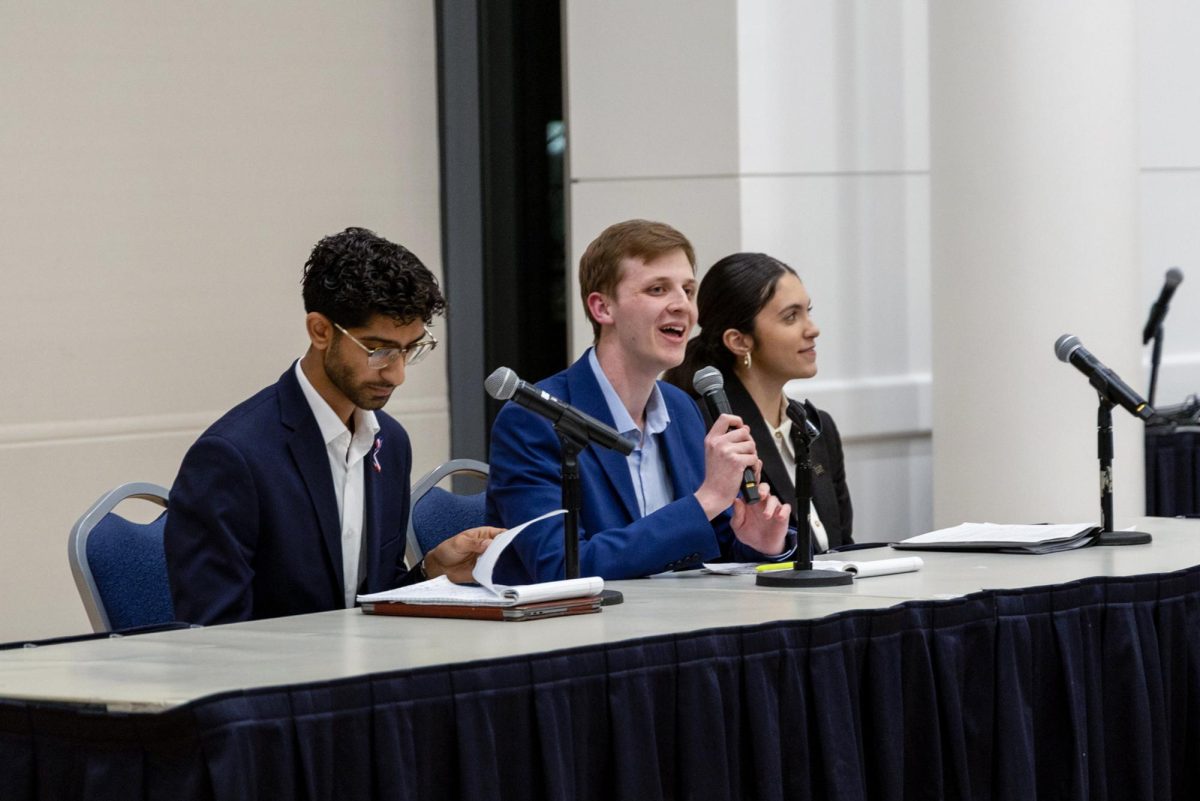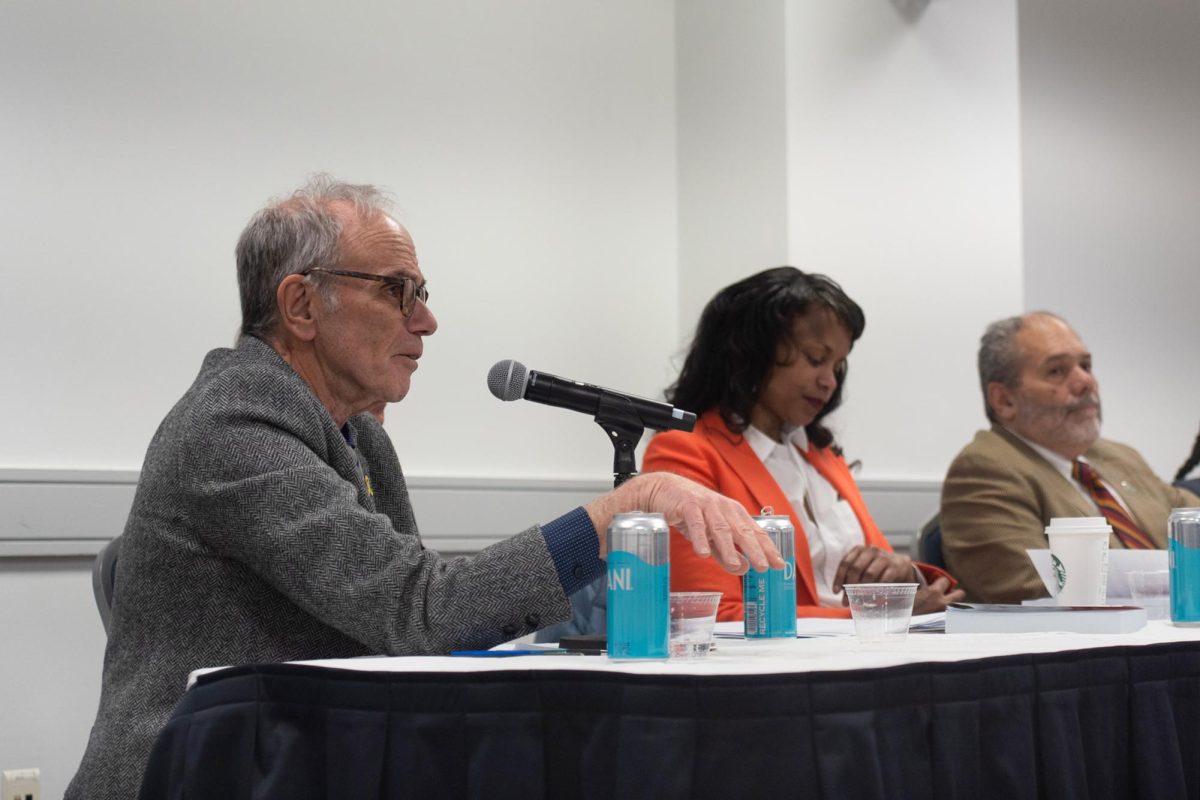In a year defined by campus unrest and mounting federal pressure on universities to stifle protests, Student Government Association presidential and vice presidential candidates’ plans on student speech are splintered.
The campus community is closely watching University leaders, stakeholders and governing bodies for their responses to pro-Palestinian protests and President Donald Trump’s return to power. As students voice concerns that evolving GW policies and disciplinary processes threaten free speech, the SGA’s unmatched access to officials positions the body to elevate and speak on the issues dominating campus discourse — if its student leaders choose to do so.
The SGA over the last year has tried to balance voicing students’ free speech rights with protecting groups from discrimination and hate by forming working groups, releasing statements and passing resolutions. But they also faced backlash from students who said they didn’t sufficiently advocate for students during the pro-Palestinian encampment last spring.
Criticism of the SGA’s response to topical issues came to a head this campaign season when the current administration pulled out of participating in Friday’s “Hands Off Our Schools” protest, citing allegations that the keynote speaker, former Rep. Jamaal Bowman (D-NY), historically demonstrated “hateful rhetoric” toward the Jewish community.
Several student governments for universities across the DMV signed onto the protest as part of the wave of anti-Trump rallies across the country over the weekend. GW’s SGA was the only partnering organization to pull out.
The decision was met with simultaneous support and pushback, as community members flocked to the SGA Instagram’s comments to lambast the “spineless and inexcusable” decision to withdraw, while others applauded the body’s “moral clarity.”
The response highlighted the expectation that some students place on the SGA — that leaders must use the office’s power to advocate for the causes students care deeply about. But these causes are at times at odds with each other, forcing the SGA to face concerns that by supporting one group, they’ll isolate others.
In interviews with The Hatchet about the SGA’s role in facilitating campus free speech, presidential and vice presidential candidates made varying promises to protect and uplift students’ expression, with some pledging to remove the fences surrounding University Yard and demand officials consult students on free speech policy changes.
The proposals are a contrast from last year, when the SGA’s top candidates left out or indirectly referenced campus tensions spurred by the war in Gaza.
SGA presidential candidate Dan Saleem said he’d create a student organization liaison position in his cabinet to communicate groups’ free speech concerns to the SGA. He said he’ll also press officials to collaborate with students on the University’s definition of terms, like hate speech, antisemitism, Islamophobia and anti-Arab racism.
“It’s best that the student government stand as a facilitator rather than a stance-taker,” Saleem said.
SGA vice presidential candidate Liz Stoddard said she’d instate a “proactive policy” in which the SGA holds frequent town halls for all students to communicate directly about issues impacting the community, like free speech and discrimination.
“When administration isn’t creating room for those conversations, it should fall to us to create room for those conversations, and I think sometimes the SGA can be a little scared of doing that,” Stoddard said.
SGA vice presidential contender Claire Avalos said she’d advocate for protections for student organizations that the University is “silencing” for expressing their free speech rights. Presidential candidate Ethan Lynne said he’d create a “free speech” position on the SGA and ask officials to hire a third-party to conduct an audit of its protocols handling “First Amendment activities” over the last three years.
“There definitely were a lot of wrongs, a lot of lapses in judgment, a lot of missed calls,” Lynne said. “That’s what I would like for this report to point out.”
Lynne said in an interview he’d also create a committee of organization leaders to review GW’s student organization bylaws and identify anything that’s “outdated,” “weird” or doesn’t “make sense for the time being.”
His plan comes after officials last month temporarily suspended and barred Students for Justice in Palestine from hosting on-campus events for violating a rule for student organizations that students said didn’t exist prior to the document’s March update.
Lynne said he was “pretty upset” when he learned about the allegation, adding that officials should be required to communicate and consult students on any changes to binding documents, which they’re not currently mandated to do.
“We need to remove the dark cloud, there needs to be some sort of more public, streamlined process to look into policy changes,” Lynne said. “I would love the SGA to take a larger role in that because I hadn’t really seen that until what had happened a few weeks ago.”
The University last month released proposed revisions to discrimination and campus protest policies and asked the community to provide feedback on the changes through April 18.
SGA presidential candidate Emily-Anne Santiago said she’d hold frequent “listening circles” to speak and develop policies with students instead of forming SGA “task forces,” which she said don’t represent the diverse student body.
“With a task force you’re appointing six people to be the voice of a very big student population,” Santiago said. “That has not proven successful. The past three presidents have had task forces and not much to show from them.”
Former SGA President Christian Zidouemba in March 2023 commissioned a task force to address antisemitism on campus, and former SGA President Arielle Geismar in December 2023 created councils for Jewish and Israeli students and Arab, Muslim and Palestinian students, which struggled to garner SGA participation.
Controversy over the SGA’s decision to withdraw from the protest last week also spotlights differences in the presidential and vice presidential candidates’ stances on the effectiveness of issuing SGA statements on current events.
Stoddard said it will “probably be true” that her administration would put out more statements related to Trump’s attacks on higher education than the current SGA administration has, as Trump will likely continue issuing orders aimed at thwarting some students’ speech and safety.
Santiago said she’d lean away from issuing statements, as they tend to be “very performative.” When the SGA issued two “general statements” last spring about the ongoing pro-Palestinian encampment, the post’s language “isolated” students and made the assertion read more like a “political statement” than an attempt to uplift students’ “lived experience,” she said.
“All the time the SGA tries to play down the line, very moderate,” Santiago said. “If you want something solved, you need to call it out for what it is.”
The SGA released a statement a week after students pitched tents in U-Yard, condemning hate speech, restrictions on free speech and the University’s decision to punish students involved in the encampment.
The body posted a second statement on May 10 — three days after local police cleared the protest — denouncing all calls for the use of force against peaceful demonstrators.
Still, Santiago said she would’ve put out a statement for the encampment but only after speaking one-on-one with the Jewish Students Association, Muslim Students Association and Students for Justice in Palestine about their “ideal statement.” She said she’d establish a “rapport” with students on both sides before releasing the message.
Stoddard and Saleem also said they would have issued statements, like the current administration’s during the encampment, with Saleem adding that he’d remain “very objective.”
He said the SGA needs to be “more thorough” when crafting statements to ensure their language makes all students “feel safe and protected,” regardless of their views.
Avalos said she would’ve been quicker to put something out than the SGA was last year. Lynne, the SGA’s vice president, also said he wishes they had released a statement earlier.
“I feel like that’s an issue that a lot of students have brought up, that SGA is not quick enough when we make responses, and we’re kind of just waiting until the end of it to actually make a final response,” Avalos said.
Santiago publicly rejected the SGA’s decision to withdraw from the “Hands Off Our Schools” protest and said the body should’ve responded to concerns about Bowman by forming a new coalition with interested local universities or talking with the coalition organizers.
Instead, she said the SGA decided to “separate” from the cause and “give a win to the Trump administration.”
“We have the potential to be a leader, and we’re deciding not to,” Santiago said. “We’re deciding to be moderate at best but being moderate and playing the middle takes you nowhere.”
All of the candidates said Trump’s attacks on higher education — including financial aid, research, student protesters and visa holders — warrant SGA reactions, statements and legislation in dissent because the issues directly impact students.
SGA President Ethan Fitzgerald and Lynne released a statement in January about students’ fears surrounding Trump’s executive orders following his inauguration, saying they will “stand against actions that threaten the safety of our community.”
“I am pushing for a protection of our educational rights when it comes to FAFSA and the Department of Education,” Saleem said. “Does that mean I align a certain way? No, I’m saying that because that is what is in the best interest of our students and their educational goals.”
In addition to their differing views on SGA statements, presidential and vice presidential candidates disagreed on the feasibility of specific free speech goals they outlined, or omitted from, their campaigns.
Saleem, who’s platform didn’t mention free speech, discrimination or protest, dubbed some of the other candidates’ pledges to remove the fences in U-Yard as a “misrepresentation” of presidential power, as he said the decision is up to the University.
Three of the five aspirants for the SGA’s top posts — Santiago, Lynne and Avalos — campaigned on taking down the fence officials installed around U-Yard following last spring’s pro-Palestinian encampment.
“To say that the student government is going to single handedly take down the fences in U-Yard or solve the tension on campus is unrealistic, and I think it’s an injustice to students to say that,” Saleem said.
Some students have criticized the fencing, arguing that the infrastructure won’t prevent campus protests and makes the green space less accessible.
“I will work with the president and go to the administration and demand that the fences in U-Yard are taken down because I do believe they are an intimidation tactic with the administration to silence student voices,” Avalos said.
All of the candidates said they hope students press them on their specific plans for addressing free speech because they deserve to know how their future leaders would advocate for students’ rights.
“An SGA president and a leader on campus, no matter who you are, cannot be afraid of these issues,” Saleem said.





